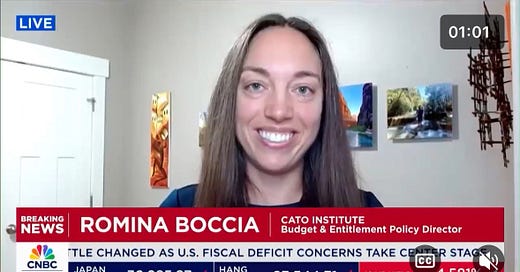On Air: One Big Bloated Bill
The House-passed reconciliation bill accelerates the U.S. debt crisis.
This week, I joined Bloomberg, BBC, and CNBC to break down the House’s so-called “One Big Beautiful Bill.”
In reality, it’s a big, bloated tax cut and spending package that accelerates U.S. public debt and avoids the hard choices needed to restore fiscal discipline. Here’s what I shared on air:
Bloomberg
The House reconciliation bill could add $5 trillion to the debt over the next decade—on top of the $20 trillion already baked in. I argued that expanding the state and local tax deduction (SALT) isn’t tax relief—it’s a handout to campaign contributors in high-tax states paid for by the rest of us. I pointed out that we’re already paying $1 trillion in interest costs on the debt, and if interest rates remain at 4.5–5 percent, we could be paying in excess of $2 trillion in annual interest by the end of the decade. If lawmakers decide to proceed with this bill, they should establish an independent fiscal commission—a Budget Realignment and Control Commission, or fiscal BRAC—to advance the tough but necessary entitlement and tax loophole reforms that politicians are avoiding. “Something has to give before we have a severe fiscal crisis,” I warned.
BBC
I reminded BBC viewers that the Senate may water down some of the more fiscally responsible parts of the House bill, such as reforms to slow Medicaid spending growth. Additionally, US legislators may reverse the more politically costly parts of the bill down the road (e.g., reversing scheduled spending cuts), as they have done in the past. A bird in hand is worth more than two in the bush. Meanwhile, interest rates are rising, and Treasury Secretary Bessent will have to roll over $9 trillion in debt this year alone. Lawmakers are gambling with US creditworthiness by plunging the country deeper into debt and deficits.
CNBC
I called it what it is—the one big bloated bill, which the U.S. House of Representatives passed early Thursday morning, after debating it all-night, will add fuel to the deficit fire during a year when Treasury is confronted with the need to refinance $9 trillion in maturing U.S. debt at now much higher interest rates.
Despite Moody’s US credit rating downgrade and bond markets screaming as they are being flooded with Treasuries, U.S. legislators’ appetite to double down on tax cuts with spending increases shows no signs of waning.




